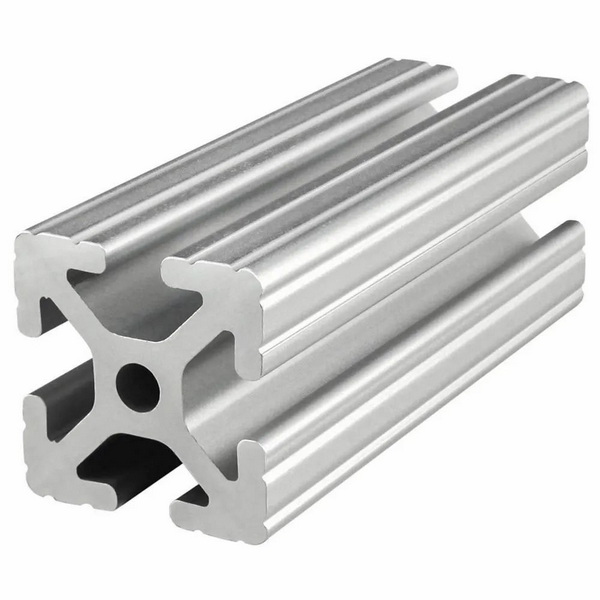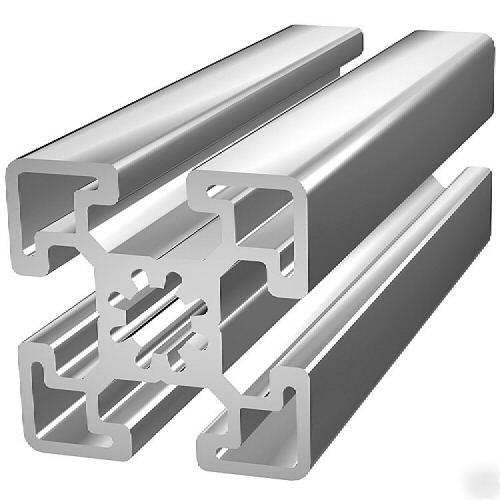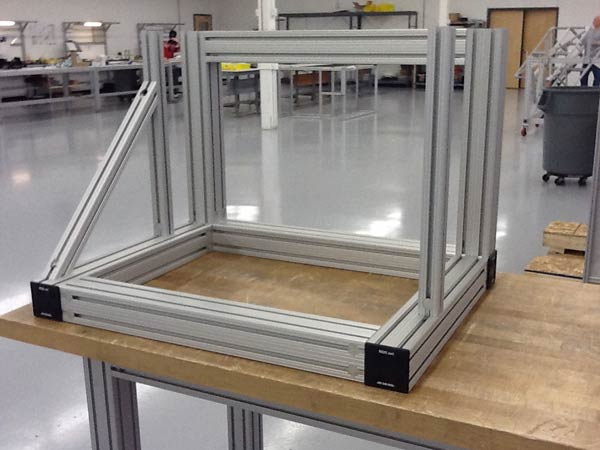Content Menu
● Understanding Aluminum Extrusions
>> Benefits of Aluminum Extrusions
● Properties of 820 Aluminum Extrusion
>> Comparison with Other Aluminum Alloys
>> Detailed Analysis of Each Alloy
>>> 1. 820 Aluminum Extrusion
>>> 2. 6061 Aluminum Alloy
>>> 3. 6063 Aluminum Alloy
>>> 4. 7075 Aluminum Alloy
● Applications of 820 Aluminum Extrusion
>> Innovative Uses of 820 Aluminum Extrusion
>> Visual Representation
● Advantages of Choosing 820 Aluminum Extrusion
● Conclusion
● Related Questions
>> 1. What are the main advantages of using 820 aluminum extrusion?
>> 2. How does the corrosion resistance of 820 compare to other alloys?
>> 3. In what industries is 820 aluminum extrusion most commonly used?
>> 4. Can you weld 820 aluminum extrusion?
>> 5. What factors should I consider when selecting an aluminum alloy for my project?
820 aluminum extrusion is a versatile and widely used material in various industries, known for its strength, durability, and adaptability. In this article, we will explore how 820 aluminum extrusion compares to other aluminum alloys, focusing on its unique properties, applications, and advantages. We will delve into the characteristics of other popular aluminum alloys such as 6061, 6063, and 7075, providing a comprehensive overview that will help you understand the best applications for each type.

Understanding Aluminum Extrusions
Aluminum extrusions are created by forcing aluminum alloy through a die to produce a specific cross-sectional shape. This process allows for the creation of complex shapes that can be used in a variety of applications. The most common types of aluminum extrusions include:
- T-Slot Extrusions: Used in modular framing systems.
- Structural Shapes: Used in construction and manufacturing.
- Custom Profiles: Tailored for specific applications.
Benefits of Aluminum Extrusions
Aluminum extrusions offer numerous benefits, including:
- Lightweight: Aluminum is significantly lighter than steel, making it easier to handle and transport.
- Corrosion Resistance: Aluminum naturally forms a protective oxide layer, enhancing its durability.
- Versatility: Extruded aluminum can be easily machined, welded, or formed into various shapes.
- Cost-Effectiveness: The extrusion process is efficient, reducing material waste and production costs.
Properties of 820 Aluminum Extrusion
820 aluminum extrusion is known for its specific properties that make it suitable for various applications:
- Strength: It has excellent tensile strength and can withstand significant loads.
- Machinability: Its composition allows for easy machining and fabrication.
- Weldability: 820 aluminum can be easily welded, making it ideal for structural applications.
Comparison with Other Aluminum Alloys
To provide a clearer understanding of how 820 aluminum extrusion stands against other alloys, we will compare it with three commonly used aluminum alloys: 6061, 6063, and 7075.
| Property | 820 Aluminum | 6061 Aluminum | 6063 Aluminum | 7075 Aluminum |
| Tensile Strength | High | Moderate | Moderate | Very High |
| Corrosion Resistance | Good | Excellent | Excellent | Good |
| Machinability | Excellent | Good | Very Good | Moderate |
| Weldability | Good | Excellent | Good | Poor |
| Cost | Moderate | Low | Low | High |
Detailed Analysis of Each Alloy
1. 820 Aluminum Extrusion
820 aluminum extrusion is often favored in applications requiring high strength-to-weight ratios. Its excellent machinability allows for precision manufacturing processes. It is commonly used in structural components where durability and reliability are critical. The alloy's ability to be easily formed into intricate shapes makes it ideal for custom applications in various industries.
2. 6061 Aluminum Alloy
6061 aluminum is one of the most commonly used alloys due to its versatility. It offers good corrosion resistance and is easy to weld. However, its tensile strength is lower than that of 820 aluminum extrusion. It is widely used in automotive parts, marine structures, and aerospace components. The alloy's ability to be heat-treated enhances its mechanical properties, making it suitable for high-stress applications.
3. 6063 Aluminum Alloy
6063 aluminum is known for its excellent extrudability and surface finish. It is often used in architectural applications such as window frames and doors due to its aesthetic appeal. While it has good corrosion resistance, its strength is generally lower than that of both 820 and 6061 alloys. This alloy is particularly valued in the construction industry where appearance matters as much as performance.
4. 7075 Aluminum Alloy
7075 aluminum alloy is one of the strongest available but comes at a higher cost. It has lower corrosion resistance compared to other alloys and is more challenging to weld. Its primary applications include aerospace components and military equipment where strength is paramount. Despite its drawbacks in terms of weldability and cost, its high strength makes it an excellent choice for critical load-bearing applications.

Applications of 820 Aluminum Extrusion
820 aluminum extrusion finds use in various industries due to its unique properties:
- Construction: Used in structural frames and supports where high strength is required without adding excessive weight.
- Automotive: Employed in lightweight vehicle components like chassis and suspension parts to improve fuel efficiency.
- Aerospace: Ideal for aircraft parts requiring high strength-to-weight ratios while maintaining structural integrity during flight.
- Manufacturing: Utilized in machinery and equipment frames where durability under stress is essential.
Innovative Uses of 820 Aluminum Extrusion
In recent years, the application of 820 aluminum extrusion has expanded into innovative areas such as renewable energy solutions. For instance:
- Solar Panel Frames: The lightweight yet strong nature of 820 aluminum makes it an ideal choice for framing solar panels, allowing for easy installation while ensuring durability against environmental factors.
- Robotics: In robotics manufacturing, the precision machining capabilities of this alloy enable the creation of intricate robotic components that require both strength and lightweight characteristics.
Visual Representation
Example of an application using 820 aluminum extrusion
*Image Caption: Example of an application using 820 aluminum extrusion.*
Comparison chart illustrating the properties of different aluminum alloys
*Image Caption: Comparison chart illustrating the properties of different aluminum alloys.*
Advantages of Choosing 820 Aluminum Extrusion
When selecting materials for your projects, choosing the right alloy can significantly impact performance and cost-effectiveness. Here are some advantages specific to using 820 aluminum extrusion:
1. Enhanced Performance: With its high tensile strength, projects using this alloy can often withstand greater loads without compromising safety or integrity.
2. Design Flexibility: The ability to create complex shapes through the extrusion process means designers have more freedom to innovate without worrying about material limitations.
3. Reduced Maintenance Costs: The corrosion-resistant properties help reduce maintenance needs over time compared to other materials that may require more frequent upkeep.
4. Sustainability: As an environmentally friendly option, many manufacturers are turning to recycled aluminum materials when producing extrusions, contributing to sustainability efforts.
5. Rapid Production Times: The efficiency of the extrusion process allows for faster production times compared to traditional machining methods.
Conclusion
In summary, while 820 aluminum extrusion offers exceptional strength and versatility suitable for various applications, it's essential to consider the specific requirements of your project when choosing an alloy. Each alloy has unique properties that make it more suitable for certain applications over others. By understanding these differences, you can make informed decisions that enhance the efficiency and effectiveness of your projects.

Related Questions
1. What are the main advantages of using 820 aluminum extrusion?
820 aluminum extrusion offers high strength-to-weight ratios, excellent machinability, good weldability, and moderate cost-effectiveness.
2. How does the corrosion resistance of 820 compare to other alloys?
While 820 aluminum has good corrosion resistance, it is generally lower than that of alloys like 6061 and 6063 which have excellent corrosion resistance properties.
3. In what industries is 820 aluminum extrusion most commonly used?
It is commonly used in construction, automotive manufacturing, aerospace components, and machinery frames due to its strength and versatility.
4. Can you weld 820 aluminum extrusion?
Yes, 820 aluminum can be welded effectively; however, care must be taken to ensure proper welding techniques are employed to maintain its structural integrity.
5. What factors should I consider when selecting an aluminum alloy for my project?
Consider factors such as tensile strength requirements, corrosion resistance needs, machinability preferences, weldability concerns, and overall project budget when selecting an alloy.






















